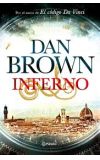
21 May 2013 14:21:46
The tall writer Steven Poole opened the wooden door of the strong house and peered at the small figure on the stone doorstep. It was a boy. Cradled in his palms the boy nervously proffered a startling object. It was the new book by the famous novelist Dan Brown.
The tall writer took the precious artefact from the nervous boy's hands and thanked him. The miniature human scuttled off. An idling engine revved into life. The writer glanced down the street, then retreated into the residential building. He knew he had better get to work. Looking at his Tag Heuer Swiss watch, he calculated that he had only 48 hours to decode the arcane puzzle of the bestselling author's latest novel.
Peeling away the plump layers of protective wrapping, the writer opened the big book and out fell an obscure document. It was a nondisclosure agreement in threatening legalese. The long-awaited novel was strictly embargoed. Nervously, the freelance writer looked out of the glass window. He saw a bright glint on a distant rooftop. Was that a reflection from the sniper scope of a patient beautiful female assassin dressed in black leather, waiting to shoot him if he let slip any details of the important book too soon?
As the tall writer turned the paper pages with a hungry rapidity, he easily visualized the celebrated symbologist and fancier of English tailoring Robert Langdon running around a series of famous tourist attractions in Florence, Venice and Istanbul. The unflappable hero was accompanied by a pretty blond doctor. They evaded hostile pursuers while trying to uncover the scary threat posed by a renowned biologist with a Dante fixation.
Later that cloudy afternoon, the determined writer sought out a branch of Starbucks, so called because according to a coded engraving by Piranesi that no one knew about but which would have baffled art historians for centuries if anyone had, the natural home of space hero Buck Rogers was among those sidereal forms described by the last word in every Canto of the famous poet Dante's renowned poem, The Divine Comedy.
Stars.
He felt he was getting closer to solving the dark riddle. The engrossed writer continued to read the fat book at the laminated table. He had removed the telltale dustjacket but still had to conceal the board covers since they were decorated with a celebrated engraving by Gustav Doré and also shouted the name of the famous author Dan Brown in white lettering. No one must see him in possession of this valuable object.
In the long book, dramatic things happened in beautiful places. The fact-packed text revealed more tantalising tidbits about secret passageways and old paintings. There were obscure symbols, shiny gadgets, altered masterpieces, and purloined artefacts. There was a powerful secret organization, and proper science about population growth and tiny viruses. Sometimes, during a convenient lull in the action, the famous Harvard professor Robert Langdon would remember in real time the entire text of a lecture he had once given about Dante.
That evening the tall writer found himself at a party, where a glamorous woman asked him what he had been doing all day. He fixed her feline face with his hazel eyes. Was this a stern test from the sinister people watching him unseen from the murky shadows? There was no way he could admit he had even smelled the forthcoming novel by the famous author Dan Brown. "Nothing!" the writer shouted hoarsely. "And don't touch my Harris Tweed!"
The attractive woman looked at him with a strange glint in her green eyes. "But you aren't wearing any Harris Tweed." Then, with an inviting smile, she gave him a mysterious drink. Then another. At some point blackness descended.
The befuddled writer awoke the next day to find himself in a strange underground cavern, at the centre of which lay a blood-red pool of liquid the colour of red blood. Then he heard a terrifying disembodied whisper. In the blood-red underground strange cavern, the whisper bellowed: "CHTHONIC."
Then the hungover writer woke up, because the previous paragraph had only been a dream. But something in it had seemed familiar. Slowly, he picked up the Italian-themed novel, and turned back to the first page. There, with a shock, he saw it printed: the word "chthonic". And he realized that if the global plot of the page-turning writer Dan Brown was to encourage his fans to read Dante and use words like "chthonic", there was absolutely nothing anyone could do to stop him.
The tall writer began to analyze the blockbusting novel using his close knowledge of conceptology, the famous discipline about thoughts. He saw instantly that the stout book was brilliantly engineered. Its vivid paragraphs were short. Its establishing shots were cinematic. It repeated adjectives and explanatory phrases from one paragraph to the next, perhaps to jog the dulled short-term memory of the tired long-haul flier. It made art and poetry seem glamorous, and mixed them with luxury tourism and scenic chases. It spoke with the seductive urgency of a good-looking someone telling you a brainy secret.
At last, that night, the satisfied writer finished the exciting book. He gazed enigmatically into the middle distance. Then, using only his fleshy brain and a metal laptop, he began to compose his historic review.

